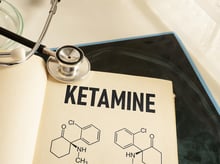No Benefit Found for Repeat Ketamine Infusions Among Hospitalized Patients With Depression
 Hospitalized patients with depression do not appear to benefit from repeat intravenous infusions of ketamine as an adjunct to usual inpatient care, according to a clinical trial published today in JAMA Psychiatry.
Hospitalized patients with depression do not appear to benefit from repeat intravenous infusions of ketamine as an adjunct to usual inpatient care, according to a clinical trial published today in JAMA Psychiatry.There were no significant differences in depression scores on the Montgomery-Åsberg Depression Rating Scale (MADRS) or on other secondary outcomes between patients who received ketamine and those who received midazolam, which was used as a “psychoactive placebo” because it mimics the sedative effects of ketamine.
“Despite widespread clinical enthusiasm based on early reports of large rapid antidepressant effects of single ketamine infusions, our finding of a small between-group difference falls below both the effect sizes reported in prior open-label or saline-controlled studies, and the minimal clinically important difference for the MADRS,” wrote Ana Jelovac, Ph.D., of St. Patrick’s University Hospital, Dublin, and colleagues.
Sixty-two hospitalized patients with unipolar or bipolar depression and a baseline MADRS score of 20 or more received up to eight twice-weekly intravenous infusions of ketamine (0.5mg/kg) or midazolam (0.045mg/kg). The infusions were provided alongside routine inpatient psychiatric care, including medications, occupational therapy, and other interventions.
The primary outcome was change in MADRS depression scores 24 hours after the final infusion. Secondary outcomes included self-reported depression severity, safety, tolerability, health care costs, and quality of life.
At the end of treatment, average adjusted MADRS scores were 3.16 points lower in the ketamine group than the midazolam group, but this was statistically non-significant. The authors noted that the limitations of midazolam as a placebo—most raters and patients knew which treatment they were getting—suggests that even the non-significant difference in MADRS scores may be inflated by expectancy bias.
Additionally, there were no significant between-group differences on other secondary outcomes, including cognition, cost-effectiveness, or quality of life.
The authors concluded: “These results underscore the need for a cautious interpretation of saline-controlled studies and innovative trial designs that can effectively control for nonspecific effects inherent in ketamine trials in psychiatry.”
For related information see the Psychiatric News article, “Ketamine: Miracle Drug or Double-Edged Sword?”
(Image: Getty Images/iStock/Andrii Dodonov)





